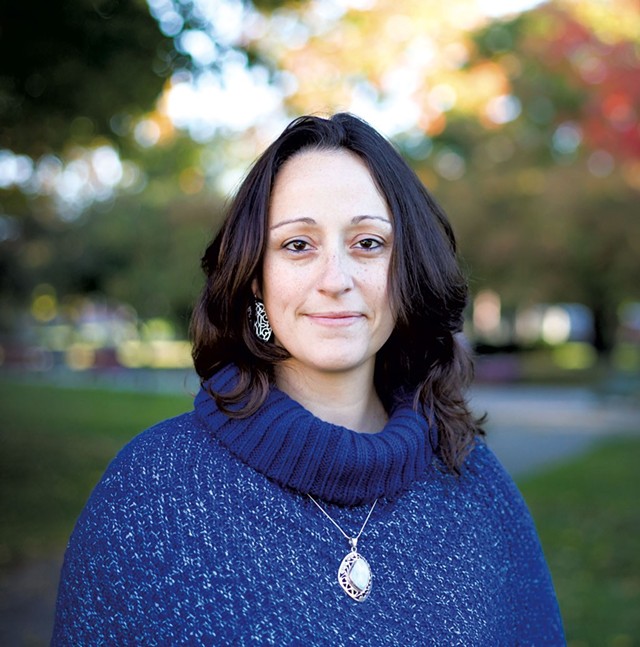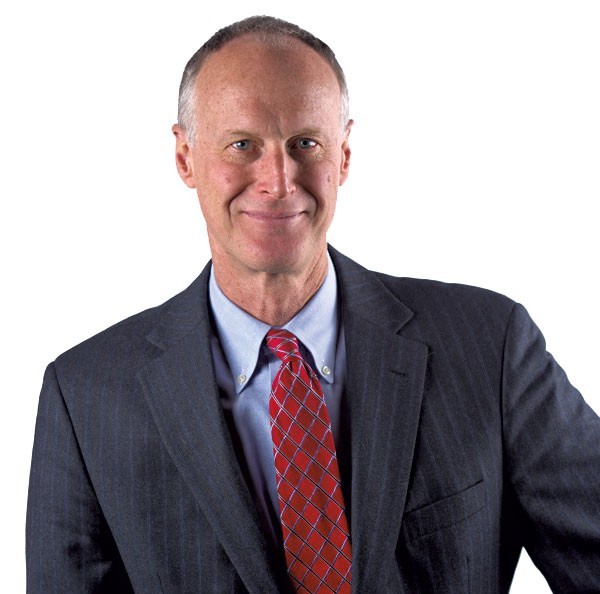Published April 30, 2019 at 10:00 a.m.
There's a photograph that Jes Stumpf keeps in an album in her bedroom and thinks of fondly. Taken almost four years ago, it shows Stumpf the day she gave birth for the third and last time, while serving as a surrogate for a couple who could not have children. Stumpf lies in a hospital bed cradling a newborn baby boy, swaddled in a blanket and wearing a knit cap. On the left are her husband, then-11-year-old daughter and then-13-year-old son. On the right is the couple Stumpf carried the child for — known as the "intended parents" in the surrogacy world. Everyone is smiling.
Stumpf, 40, likes to imagine zooming out from the scene in the photograph. In her mind's eye, she sees the doctors and nurses who helped deliver the baby. Zoom out a little more and there's the obstetrician and all the medical professionals who supported her during the pregnancy. Then there's everyone at the fertility clinic who helped the intended mom and dad in their journey to start a family. Also in the imagined scene: the lawyers who hammered out the arrangement and the therapists, friends and relatives who supported the intended parents through their struggles with infertility.
Stumpf envisions all of these people leaning in, gazing adoringly at the newborn baby as if to say, "Look what we just did."
On the Rise
It takes a village to raise a child, the adage goes. But, sometimes, it also takes a village to make a child.
With surrogacy, parents who otherwise would not be able to conceive a child work with a woman willing to carry a baby for them. Sometimes the surrogate is a relative or friend, but increasingly, as in Stumpf's case, the parties are connected by an agency — and the surrogates are compensated for their role.
The first compensated surrogacy agreement on record in the U.S. occurred in 1980; the surrogate used her own egg and carried the child, a process now known as traditional surrogacy. That practice fell out of favor after the high profile case of "Baby M." In 1985, a New Jersey woman, Mary Beth Whitehead, entered into a traditional surrogacy agreement with a married couple, William and Elizabeth Stern, using William's sperm. But when the child was born, Whitehead decided she wanted to keep the baby. After a legal fight, the Sterns were given custody, but the case highlighted the complicating factors that can arise when the surrogate is biologically related to the baby she carries.
Today most surrogacy falls under the category of gestational surrogacy, in which the intended mother or a donor provides the egg, and the intended father or a donor provides the sperm. The surrogate's own egg is never used. The embryo or embryos are then implanted in the surrogate, who carries the baby.
This practice is on the rise in the U.S. According to data from the Centers for Disease Control and Prevention, the number of gestational carrier cycles — instances in which an embryo or embryos are transferred into a surrogate — increased from 727 in 1999 to 3,432 in 2013. Between those years, gestational carrier cycles resulted in 13,380 deliveries and 18,400 babies, including multiple births. In a preliminary report from the Society for Assisted Reproductive Technology, 6,422 gestational carrier cycles were reported in the U.S. in 2017 alone. High-profile celebrities who have used surrogates — including Neil Patrick Harris and Kim Kardashian — have also increased public awareness.
It's difficult to know how widespread the practice is in Vermont; no one tracks the number of local families who have worked with surrogates, or the number of women who have served as carriers. Paid surrogacy received a boon in the state in 2014, though, with the establishment of both the state's only surrogacy agency and its only fertility clinic that implants embryos in surrogates.
And the practice became more legally secure last year with the passage of the Vermont Parentage Act, which allows parents who use a surrogate to establish parentage prior to the baby's birth and to have their names put on the baby's birth certificate at the time of birth. Before the bill was passed, the surrogate's name appeared on the birth certificate until it was amended in probate court. Colchester's Northeastern Reproductive Medicine, the only fertility clinic in Vermont that offers gestational carrier services, completed 31 gestational carrier cycles between 2015 and 2017.
There is no federal law regulating paid surrogacy, in which intended parents provide compensation to a surrogate that goes beyond medical and pregnancy-related expenses; state laws vary. Paid surrogacy is illegal in New York and Michigan, though compassionate surrogacy, in which a woman carries a baby for her friend or family member and receives no additional compensation, is legal in those states. Louisiana prohibits paid surrogacy and allows compassionate surrogacy only when the intended parents' sperm and egg are used.
Laws vary outside of the U.S., as well. Paid surrogacy is illegal in Canada, Denmark and the United Kingdom, and all forms of surrogacy are banned in Bulgaria, France, Germany, Italy, Portugal and Spain. Critics of paid surrogacy cite concerns about exploitation or coercion of the surrogate, as well as religious objections.
But for proponents of the process, the experience can be a transformative one, both for the surrogate and the intended parents. "This is about helping people have families who can't," said Stumpf. "When you get to the point where you need to work with a surrogate, you've tried everything. You're at the end of your rope and you have nowhere else to go, and you need some amazing woman to be there to say 'Yes.'"
"Born on the Spot"
Stumpf's interest in gestational surrogacy started around six years ago, when a close friend was experiencing fertility problems. Stumpf had given birth to her own children when she was in her early 20s. Both pregnancies went smoothly, and she enjoyed being pregnant. She offered to carry her friend's baby. Ultimately, that friend decided not to have children, but Stumpf couldn't get her mind off the idea of being a surrogate. "If I would do this for her, why wouldn't I do it for someone else?," she remembered thinking.
She found an out-of-state surrogacy agency that matched her with a couple who had struggled to conceive.
In the midst of her research, she sought legal advice from Kurt Hughes, a partner at the Burlington law firm of Murdoch Hughes Twarog Tarnelli who has worked in adoption law since 1995 and surrogacy law since around 2000. Stumpf asked him if he'd ever considered starting a surrogacy agency in Vermont. In fact, he had. "It bothered me a little that Vermont residents and carriers had to go to out-of-state programs to do matchmaking," Hughes explained, "and it was just one of those ideas in my head that I never acted on."
The two decided to join forces. Vermont Surrogacy Network "was kind of born on the spot," said Hughes. The agency opened in September 2014, before Stumpf had even become pregnant as a surrogate. Since then, 17 babies have been born with the support of VSN, with at least six more due this year.
"A Hail Mary"
People turn to surrogacy for different reasons. Couples who have exhausted infertility treatments, women whose medical conditions make pregnancy risky or preclude it altogether, and same-sex couples are among those who opt for the process. And women who understand the desire for family so deeply they want to help others fulfill it offer to carry their child.
Though 12 percent of women have difficulty getting pregnant or carrying a pregnancy to term, according to the CDC, just a small fraction of those women and their partners choose surrogacy.
"We don't take the use of a gestational carrier lightly," said Dr. Peter Casson, an obstetrician-gynecologist who left University of Vermont Medical Center to open Northeastern Reproductive Medicine in October 2014. The fertility clinic often partners with VSN to implant embryos and provide other surrogacy-related medical services. "It's complicated and it's expensive and has to be done just right," said Casson. "It's not something you suggest off the cuff. It's kind of a Hail Mary."
Indeed, intended parents pay an estimated $75,000 to $100,000 — including legal fees — to go through the full gestational surrogacy process with VSN. The associated medical procedures — including egg retrieval in some cases, preimplantation testing of embryos to detect genetic defects and embryo transfer — are involved ones, and, in the case of transfers, sometimes unsuccessful.
But many couples who opt for surrogacy are already familiar with involved medical procedures. That was the case for an intended father from Québec, who asked to remain anonymous because of the personal nature of his story. He and his wife had undergone 13 rounds of in vitro fertilization over the course of nine years, a journey that left them emotionally drained. They learned that the intended mother's eggs were not viable, so they worked with Northeastern Reproductive Medicine and VSN to find an egg donor and a surrogate in Vermont. Their son was born 16 months ago. Despite pregnancy complications — their surrogate developed preeclampsia and was induced at 34 weeks — they are working with that surrogate again, primarily because of the strong bond they formed. "I think we're going to be lifelong friends," he said. Their second child is due in September.
Some intended parents are past the biological window to conceive a child. Terry and Colin O'Brien of New Hampshire had tried and were unable to conceive naturally. Years went by. In their 50s, they decided it was important to them to become parents, and they found VSN. "Relinquishing control" to the surrogate to carry their baby was a challenging notion at first, said Terry. But once they met the surrogate that Stumpf had matched them with, along with her husband, "we came away feeling like we had known them for years." Their son was born in January 2018, with both Terry and Colin in the birthing room. "She took such wonderful care of him during her pregnancy," Terry said of her surrogate.
About half of intended parents who work with VSN are same-sex male couples. Chapin and Kevin Fish, who live in Massachusetts, were the first couple that VSN worked with. At that point, in 2015, they were already having a child via compassionate surrogacy with a friend. They knew they wanted their child to have siblings and found another surrogate through VSN. She agreed to have two embryos transferred at Yale Medicine Fertility Center. In early January 2016, the couple's daughter from the first surrogacy was born. Eight months later, their twin sons arrived. "We knew we wanted kids from birth," Chapin said, and he and Kevin appreciated that surrogacy allowed them to control the timeline.
Katie, a resident of New York City who asked that her last name not be used to protect her family's privacy, came to VSN after losing the ability to have children due to cancer treatment. After exploring adoption and contacting several surrogacy agencies, she and her husband chose VSN. She liked the small size of the agency, the fact that Stumpf had been a surrogate herself and that Hughes had extensive experience writing surrogacy contracts.
Stumpf matched Katie with Eliza, a surrogate from northern Vermont who has two daughters of her own. Katie said she got a good vibe from the very beginning. "We just clicked," said Katie. Because she saw what an amazing mom Eliza was to her own children and knew of her passion for nutrition, Katie said she was "able to trust her completely" to carry her child.
Katie's daughter was born eight months ago. She and Eliza exchange texts every week or two and hope to meet for a weekend in Vermont this summer.
"At the end, it is a business transaction," said Katie, "but there's so much more behind it in terms of emotions and sensitivity."
Like Online Dating
Around 10 to 15 percent of VSN's clients have a compassionate carry arrangement with a friend of family member. They use VSN for services including medical record and health insurance review, coordination with the fertility clinic and assistance in preparing a legal contract.
But the majority of intended parents come to VSN looking for a surrogate. This multistep process initially bears some similarity to online dating. Surrogates and intended parents fill out extensive applications that ask about medical history, reasons they want to be involved with surrogacy, and questions such as under what circumstance they would want to terminate a pregnancy and whether they want two embryos transferred with the intention of producing a twin pregnancy. There's no "right answer" when it comes to these questions, said Stumpf. The goal is to match surrogates and intended parents whose answers align.
Stumpf also meets surrogates and intended parents face-to-face, or through video conferencing, to get a better sense of who they are. To work with VSN, intended surrogates must be between 23 and 42 years old and have had at least one pregnancy with no major complications that has resulted in a child they have raised or are raising. Their medical records undergo a cursory screening by a consultant hired by VSN when they begin working with the agency, and a more in-depth screening at the fertility clinic once the surrogate and intended parents are matched.
Intended parents may be turned away if VSN determines that they are not emotionally ready, they are not respectful of the process, or they indicate that they think they should be allowed to control the surrogate's decisions. "There, of course, are reasonable expectations, such as not drinking or smoking, or travel restrictions," said Stumpf, "but trusting your surrogate to make healthy choices for your baby while going about her everyday life is a requirement for an intended parent."
In addition to compensation for all pregnancy-related expenses, VSN's surrogates receive a base fee of $35,000, with more compensation for an experienced surrogate or a surrogate who carries twins. Stumpf considers it her ethical responsibility to ensure that surrogates are not pursuing the role purely for financial reasons. "If this is something you're looking to support your family with, you're not qualified," she said. If, however, a surrogate says the money will allow their family to build a garage, or contribute to a college or retirement fund, then that is acceptable.
One question Stumpf says she always asks potential surrogates is, "What do you imagine it will feel like to release the child to the parents?" She said some women "immediately go to that really happy place" and talk about how amazing it will likely be while others might say, "I imagine it's going to be a little sad that it's over." Both reactions are OK, says Stumpf.
Stumpf says her own experience of giving birth to someone else's child was an amazing one. When the baby was born, he bore a striking resemblance to his intended dad. "To see his father hold him for the first time with tears streaming down his face, it was just breathtaking," said Stumpf.
A Customized Contract
When a surrogate and intended parents are matched by Stumpf, they review each other's applications. If they decide to move forward, they speak on the phone, then arrange a face-to-face meeting. If that goes well, they enter the contract stage. With one attorney — often Kurt Hughes — representing the intended parents and another attorney representing the surrogate, a contract is drawn up that essentially states that if the pregnancy is successful, the intended parents take all financial responsibility for the expenses associated with the pregnancy, as well as legal and financial responsibility for the baby. It also addresses potential scenarios, such as the cases in which the pregnancy may be terminated, what kind of compensation the surrogate would get if she had to have a hysterectomy, and what would happen if twins unexpectedly resulted, explained Hughes.
Intended parents must also pay for health insurance for the surrogate if her existing plan does not cover surrogacy, as well as a $500,000 life insurance policy the surrogate can designate to beneficiaries of her choosing. The contract is customized for each set of clients, down to granular details like how additional compensation would work if the surrogate has to go on bed rest to whether the surrogate will pump breast milk. (The agency's surrogates never nurse the baby.) In addition, lawyers draw up a prebirth planning order that spells out the logistics of the birth.
The surrogate and intended parents will discuss dietary restrictions, medications, travel and preferences for natural or medicated childbirth throughout the process, said Stumpf, but these are usually not official parts of the contract. "When it comes to her body, the surrogate makes all the decisions," said Stumpf, but ultimately, "most surrogates are very open to decisions the intended parents would like to have, as this is their baby."
"I Know It's Not Mine"
Almost all of the surrogates who work with VSN live in Vermont.
It's "one of the healthiest states in the country," Stumpf says. "It's 'Eat More Kale.' We grow great babies here." Because of that image, she says, couples from out-of-state considering surrogacy are particularly drawn to Vermont.
Bethany Johnson of St. Albans was a surrogate through VSN in 2017 into 2018. "Having babies and carrying babies was fairly easy and fun for me," said Johnson, who works in the nonprofit sector. When she applied to be a surrogate, her children were preteens — "out of my lap and off my hip" — so she felt that the process wouldn't have a major impact on her family. She was matched with a couple from a neighboring state and met them for breakfast in Montpelier. Because they already knew so much about each other, she said, they both felt immediately at ease.
The actual process isn't easy, though. A surrogate must take progesterone injections and estrogen pills before the embryo is transferred and for around nine weeks after. The hormones suppress the surrogate's ovaries from releasing eggs and trigger the body to act as it would during a natural pregnancy. In Johnson's case, the first embryo transfer was not successful. She asked for one month to give her body a break and then underwent a second transfer, which was successful.
That feeling of being pregnant was "just as incredible as with my own," said Johnson. Some people asked her how she was going to "give up" the baby. But she always explained to them, "I know it's not mine."
When Johnson gave birth to a baby boy, she, her husband and the intended parents passed the baby around for hours. She said it was relatively easy to step back into her life after the experience. There was no baby paraphernalia in her house, no cries waking her up at night, and no searching for childcare, although, for seven weeks, she pumped breast milk and overnighted it to the intended parents. Johnson is 44 now, so being a surrogate again isn't an option but, she said, "If I was 10 years younger, I'd do it again." The experience of "giving up control of some part of my life and body to this mom ... created a bond," said Johnson. "Man, I love this woman."
Eliza — who carried Katie's daughter — spoke of the range of reactions she received when she explained that she was a surrogate. "Some people thought it was amazing; some people thought you shouldn't mess with science that way; some people didn't understand the baby genetically didn't belong to me," she said. She viewed the questions as an opportunity to educate people on infertility and surrogacy.
Ultimately, said Eliza, her decision to become a surrogate was inspired by the love she has for her own children — and her desire both to help others experience that kind of love and to serve as a role model for her kids.
"I couldn't imagine my world without them, and I just want them to be good people when they grow up," said Eliza. "When you get a chance to do something selfless in your life, you should definitely move forward with that."
This article was originally published in Seven Days' monthly parenting magazine, Kids VT.
More By This Author
Speaking of...
-

Back to School During Delta: A Pediatrician With Young Children Offers a Road Map — and Survival Strategies
Aug 24, 2021 -

Can You Dig It? Make Your Own Worm Farm With These Simple Steps
Aug 24, 2021 -

Mr. Fix-It: Marty Spaulding Works Behind the Scenes to Help Students Learn on Campus
Aug 24, 2021 -

How to Savor Vermont's Shortest, Sweetest Season
Jun 29, 2021 -

Strong Like a Mother
May 4, 2021 - More »
Comments
Comments are closed.
From 2014-2020, Seven Days allowed readers to comment on all stories posted on our website. While we've appreciated the suggestions and insights, right now Seven Days is prioritizing our core mission — producing high-quality, responsible local journalism — over moderating online debates between readers.
To criticize, correct or praise our reporting, please send us a letter to the editor or send us a tip. We’ll check it out and report the results.
Online comments may return when we have better tech tools for managing them. Thanks for reading.


















































